

“Lets talk fast because it can disconnect with these phones.”
The first words from Mulatu Astatke, the 66 year old don of Ethiojazz, prove to be sadly prophetic. Perhaps a bit of prophecy is appropriate for a man who is talking, on some very iffy phone lines, from the cradle of civilization, Ethiopia. The last few years have seen a massive jump in greater public awareness of Mulatu’s music with Jim Jarmusch’s extensive use in the ‘Broken Flowers’ OST, readily available vinyl and the continued celebration of his 'Volume 4' of the Ethiopiques CD series getting long overdue credit and sales. However 2009 has been a veritable bonanza for Astatke - a show with Malcolm Catto’s frequently stunning outfit The Heliocentrics last year evolved into a 10 day recording session that yielded the ‘Inspiration Information’ album, and Strut finally managed to do what Soundway had attempted a couple of years ago, and released a quality retrospective - ‘New York- London- Addis The Story Of Ethiojazz 1965-75’ (though Soundway gaffer Miles Cleret did write the sleevnotes).
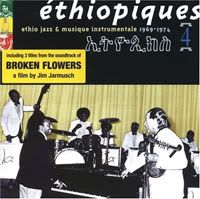
My first encounter with Mulatu was on a tape from 80's (possibly emanating from the Small Town Thunderers/Jackdaw With Crowbar axis) though at the time I didn’t know who it was because it was simply called ‘Ethiopian track’, or something similarly generic. It was a solitary clue that there was something different there to all the African music I had heard. That was followed by a few, probably slurred, enquiries on late night taxi rides over the years and locales with Ethiopian drivers about what on earth they were playing, leaving hazy memories of some great tunes but not many names the next morning, that problem remains.
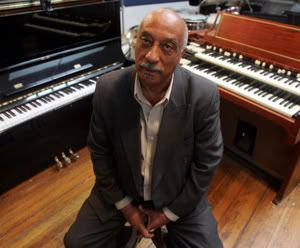
The next proper connection was made when I guested on the Hotpot Radio show with my pal, the venerable Trevor Whatevea, and his co-pilot Mnsr Scruff in Manchester in 2003. Scruff had the Worthy Records, 'Mulatu Of Ethiopia' album (surprise, surprise…he has just about everything) and played a track, on one of the several shows they were recording that day. My interest was severely piqued, thinking this sounds like that track I used to have on tape, and sure enough there was ‘Netsanet’, the very song that had hooked and absorbed me a decade or two previous.
That day looked a bit like this.
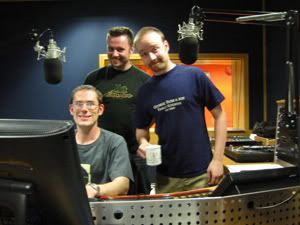
A fruitless and frustrating search for the vinyl in the record shops of Manchester, Birmingham and London followed, before I discovered it in the unlikeliest of locales on my way back to NZ at the house mecca, Dancetracks in the glorious old L.E.S. of Manhattan. I'm pretty sure it's the re-issue, but even they were scarce on the ground then. One of only a fistful of doof-free discs in that entire legendary shop, I was made up, and naturally it lit a fire underneath my proverbial record searching ass - for Mulatu and more music and knowledge about Ethiopia, which continues to this day.
I had tried to make contact for an interview with Mulatu a few years ago, and put my hand up when the Heliocentrics album dropped (even though I was initially a tad disappointed by that one, possibly down to unreachable expectations of that pairing) but this time the circuits connected, and a time and date was set. I’ve been on the interviewing game for some time now, and like DJing, it takes something fairly monumental to get me clammy handed. Talking to Mulatu ranked up there.
With a monstrous delay, and sufficient crackle to make the next Burial album, as an obstacle to free conversation, plus enough failed connections to require a bionic dialing finger, the Ethiopian telephone service did its' level best to not let this happen. We both persevered and got very frustrated by that along the way, but there was actually a lot more salvageable dialogue than I first thought. Below is the un-edited conversation, his words are exactly as he said 'em, and I understood 'em, only minus a couple of bits that were impossible to decipher above the tele-noise. There may well be a part 2 to this, and soon, but for the meantime read on.
I began by thanking him for his music, like the groveling fanboy I truly am.
“You get the last one, the compilation records?”
Indeed I have and I think it may be the one to introduce a lot more people to your music
“I think so too, I’m very happy. Which music are you thanking me for ”
Well all of it really, though I can’t go beyond the Golden Era classic Ethiojazz stuff, like the the Budha comp and L’Arome Productions vinyl albums, and of course the re-issued Worthy album. (I think I may have struck a nerve here by not simply bigging up the recent releases, not an ideal start, he sounded kind of understandably potentially grumpy at this point)
“Well I don’t follow that very much seriously. I have only recordings on the Ethiopiques, number 4, that’s my collection but the rest I don’t know very much about that. Budha records are producing those music, and I don’t follow the other ones”
Righto. Having lived through the Emperor Selassie’s reign and a brace of successive dictatorships with martial law and all the rest, I wonder how much of a presence his music currently has in Ethiopia media?
“I’m a prominent composer, arranger and I had radio programmes I also had before, a television programme, I wrote for a play, I’m in different... you know bands, I release CDs and I travel.”
Why is Ethiojazz, and in fact most Ethio music, so different to other African forms, is it just the isolation?
“Well now with Ethiojazz it has been 40 years I have been creating it you know. Why its different, why we are different to most is we have one mode which is called Anche Hoye, which is not found in any other part of the world at all. And also we use five tones to compose our music, five tone scales. What I did was I use also twelve tone music, so this is five tone against twelve, that’s how Ethiojazz is. The area I’m talking about is when you have three or four cultures, trying to put them together you really have to be very careful that one doesn’t dominate another one, and you must have a feel. My feel is Ethiopian mode, Ethiopian scales. So what I did was, I combined with twelve tone but I have to collect my own progressions, I sort of like have to create my own voicings, so that it doesn’t really disappear the Ethiopian modes at all. So you know it’s been very interesting but hard work, but now it's very big in the world.”
How was working with the Heliocentrics, obviously you have been working with Either/Orchestra in Boston for some time, was this a considerably different bag?
“Well you know it’s just what I've been doing, that’s actually just Ethiojazz music, what we’ve been doing now together but its only the orchestration is a bit different. We use more electronic now, I use a lot of acoustic before, but it sounded really nice. I think it’s a beautiful combination, and actually when am I doing the arrangement for different bands I do it different ways. When I do the Heliocentrics now we are really very much together. I write so it could suit the Heliocentrics.”
Is your project adapting traditional, pentatonic Ethiopian instruments to play the twelve tone scale ongoing?
“Yes that’s a very interesting project, which I’ve actually got about 70% now, because you know, I’ve been touring, I’ve been doing something else so I just let it go for awhile. We managed to play ‘Mercy Mercy’, ‘Never On A Sunday’, you know ‘Summertime’, those kinds of things, playing with a krar, which is so interesting I tell you. It was on the television and the people loved it and it was really great.”
A krar
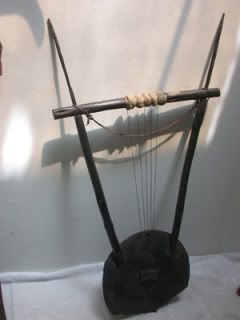
You really are changing music by doing this.
“I’m trying my best my friend. And also there is one very interesting thing, actually its going to come out on my new CD (Mulatu Steps Ahead). I'm going to London next week, to complete my new CD you know. You see there is this tribe in the south of Ethiopia we call them Dirashe . This tribe they play a diminished scale, my friend. So they’ve been there for centuries and centuries. What I did was I bought them up to the city, to Addis, and I filled it with jazz and made a beautiful programme on television. So this has been so interesting, its going to come out on my new CD you know, and I’ve been doing that, and also I have done an opera. Very interesting opera , written when I was at Harvard. Its about the Ethiopian Orthodox Church, the whole story is about a conducting stick. We used to conduct music in 380AD, it's centuries ago, when there was no symphony orchestra in the world. So the whole idea is Ethiopian contribution to the development of the whole of music. So I used this stick, I took about forty or fifty minutes from the part where we used the conducting stick, with violins and cellos and everything, and the choirs as well, and that has been conducted with that stick which makes it so interesting. So I’m trying to finish my opera as well now.”
There was more here, but the Ethio telco was doing me no favours, I understand there is also an electronic component to the opera, and he has already presented a portion of it at Harvard. I did know enough to offer another slightly informed question when we had stopped yelling ‘Hellooooo’ at each other (I think I may have some Ethiopian cussing on tape, there was certainly a bit of blue from yours truly, as I ran through the best part of ten calls getting connected, and then having one side go down immediately… somewhat frustrating)
Is this the Yared Opera that you plan to perform in the Lalibela churches (said with some very hesitant, but apparently correct pronounciation, just don’t start me on some on the names of some of those singers!)
“Yeeeeesss, exactly, that’s what I’m really working to put it on at a Lalibela church. You know about them?”
(As seen above the churches in the sacred city of Lalibela are literally hewn from the rock, rather than rock being broken down for construction, the rock is removed to reveal the structure. This is some architecturally awesome, devotional digging and stonemasonry on a stupefying level.)
A little, with buildings made entirely of stone the acoustics would be unlike anywhere else it would be incredible?
“I know, I know it will be something beautiful because the architects work on that is so interesting, and if we also show the mekwamia there – what you call this, the conducting mekwemia, that’s really an Ethiopian contribution to the world. The architects of the conducting.”
Saint Yared's foot stabbing incident (hit the Yared link below for the scoop on that!)
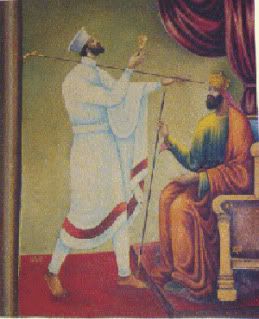
I’m not entirely sure whether he means, the architects of the incredible churches in the sacred city of Lalibela, or as the architects as in modern music (in particular Saint Yared, who is believed to have been the first to write musical notes, centuries ahead of Western civilisation, and a great deal more. Don't start me on the rasta/reggae links here, I'm stopping myself from rambling on about everything from Bob's 'Three Little Birds' to Prince Fari's chants), as he references at the end. Never mind, he’s on a roll.
"Especially the Dirashe is so interesting. When we studied jazz at Berkeley, they were telling us how Charlie Parker created the diminished key to create modern jazz, and the great composers Debussy, Bach and all this, been using a diminished scale for composing you know. So what is really very interesting is this tribe have been there for centuries and centuries, so what I wanted to know is, is it Charlie Parker? or is it these tribes, or who? what? Creating the diminished scale, so that is one thing I am working on in the future, answering that.”
And then the line went dead, time was well past done, boohoo sob sob.
I hope I haven't taken liberties in writing this up, the line was wack and the connection was weak, the delay was insufferable.. transcribing was no barrel of laughs. The name of the tribe he refers to, and the YouTube clips are of, is an informed guess, as I cannot find a direct reference to them and their diminished chords online. I'm no expert on this stuff but I have learnt a little about Ethiopia over time, researching for the interview and this post has increased that and led me down some interesting web wormholes (it's also prepped me for round 2). Hope you enjoy it, and buy that crucial compile etc.
Big thanks to Marty @ Border.

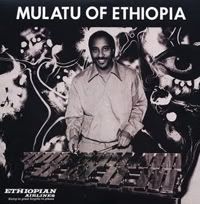
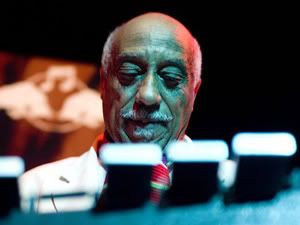
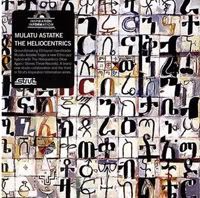
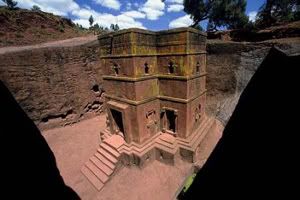
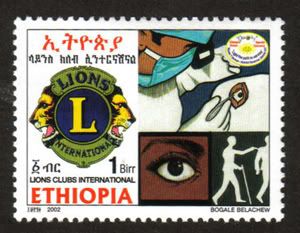
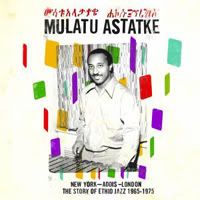




there's a book in there jim. musicology without apology.
ReplyDeleteDamn that El Pres, always beats me to the punch, must be time for a coup!
ReplyDeleteAwesome piece, African telecommunications notwithstanding. I first heard about Mulatu, several years ago mentioned in the same company as other visionary composers and bandleaders like Duke Ellington and Sun Ra The track that first caught your ears, is alas the only one I have on record on an African jazz/funk comp. No surprise that you have sparked my record-hunting instinct...time to go walkabout, off across the desert, scouring every music emporium across 7 continents..not returning until I have found my prey...failing that I can also order it on the internet - It's not quite the same though!